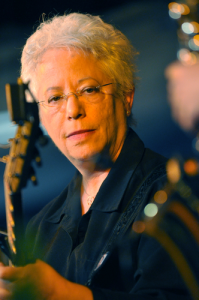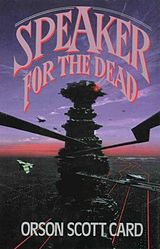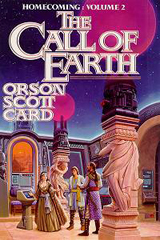I’ve enjoyed reading Mahonri’s pieces on Orson Scott Card, Ender’s Game, and homosexuality. I’ve actually been hard at work for the past few months working on an article about Ender’s Game to coincide with the release of the movie. Although my article doesn’t address the topic of homosexuality itself (it’s a more general look at how Mormon themes are exhibited in Ender’s Game), I’ve recently re-read several of of Card’s works. I’ve also observed for years that he, like Robert Heinlein, has gradually been adding more and more overt politics to his works as he gets older. On the one hand it’s easy to mock the tendency of older, successful men rambling on about their pet politics, but on the other hand I think the world generally needs more straight talk and not less. And, as I pointed out with Heinlein, this is sort of a tradition for the sci fi genre.
In any case, the first comment on Mahonri’s most recent post finally provoked a response from me on the topic of Card and homosexuality. I started to write it out in the comment section, but when I realized I was closing in on 500 words and still not finished, I decided to just write an independent post. Here’s the part about Danny’s comment that I’m responding to:
Glenn Beck, Sean Hannity, Bill O’rielly etc., all started off as main stream conservatives, as soon as they allowed their hate/prejudism to take control of their programs their Rhetoric has become a hateful propaganda that only hurts political dialogue in the US! Sadly, OSC has allowed his prejudism of “gays” to effect his beliefs on racism and sexism. OSC has put himself on the same path as the previously mentioned conservative talk show hosts.
 This analysis is deeply flawed in OSC’s case in particular, and I suspect that it’s deeply flawed in relation to Beck, Hannity, and O’Reilly as well. But let’s start with OSC. Although he was a friend of my grandfather’s, I’ve only exchanged a single email with him and we didn’t talk about any of these issues. Instead, I’m relying on the testimony of American songwriter, singer, musician, columnist and science fiction author Janis Ian who A – does know OSC personally and B – is openly a lesbian and has been since 1993. Here is what she has to say about OSC in her own words and on her own website. Here’s a selection:
This analysis is deeply flawed in OSC’s case in particular, and I suspect that it’s deeply flawed in relation to Beck, Hannity, and O’Reilly as well. But let’s start with OSC. Although he was a friend of my grandfather’s, I’ve only exchanged a single email with him and we didn’t talk about any of these issues. Instead, I’m relying on the testimony of American songwriter, singer, musician, columnist and science fiction author Janis Ian who A – does know OSC personally and B – is openly a lesbian and has been since 1993. Here is what she has to say about OSC in her own words and on her own website. Here’s a selection:
Let me say first that I consider Scott a close friend; the time we don’t have together physically, we make up through the heart. If I had to lean on someone, or needed an ear, I would think of him. And if you’ve read my autobiography, you’ll know that in a time of great trouble, he was very, very, good to me… And speaking of my partner… Scott has never treated my relationship, or my partner, with anything but the utmost respect. We’ve been welcomed into his home, invited to his childrens’ weddings, sent announcements of births and deaths – all to both of us, as a family unit. His children regard us as a family unit, and I’ve never heard or felt the slightest breath of censure from any one of them.
Obviously this depiction of Card’s relationship with Ian (and she also mentions he has other gay friends) is hard to square with the picture of a man motivated by anti-gay prejudice. There’s one additional comment Ian makes that needs to be highlighted, and it’s this:”I can’t personally recall seeing anything nasty that he’s written about being gay per se.” I added the emphasis there, because it illustrates that Janis is doing what so many are either unwilling or incapable of doing: treating a controversial topic with some nuance.
 Ian’s depiction of OSC fits perfectly with my own estimation of his beliefs and motivations based purely on reading his works which, as I mentioned, tend to reflect his personal views in ways that not all fictional works do for all authors. I’m not naively assuming that we can guess what a writer thinks based on their books. I’m stating that Card, like Heinlein, is one of those exceptional cases where we actually can, however.
Ian’s depiction of OSC fits perfectly with my own estimation of his beliefs and motivations based purely on reading his works which, as I mentioned, tend to reflect his personal views in ways that not all fictional works do for all authors. I’m not naively assuming that we can guess what a writer thinks based on their books. I’m stating that Card, like Heinlein, is one of those exceptional cases where we actually can, however.
Off the top of my head, the first major statement about marriage from Orson Scott Card came from “Speaker for the Dead” in 1986. The most illuminating passage comes from page 152:
Marriage is not a covenant between a man and a woman; even the beasts cleave together and produce their young. Marriage is a covenant between a man and woman on the one side and their community on the other. To marry according to the law of the community is to become a full citizen; to refuse marriage is to be a stranger, a child, an outlaw, a slave, or a traitor. The one constant in every society of humankind is that only those who obey the laws, tabus, and customs of marriage are truly adults.
This is a direct repudiation of the primary rationale for gay marriage, which is invariably expressed as an issue of individual civil liberties. In stark contrast to that libertarian/libertine paradigm, Card explicitly embraces the idea that individual liberties must be balanced against the needs of society. Interestingly, Card also embraces the idea that such customs may be important for no other reason than the function they offer the community. A few pages early, Ender makes this observation:
He did not care much about the priestly proscription of fornication, but he did understand how vital it was in a fragile community like Milagre for marriage customs to be strictly adhered to.
What is this function? Well in the introduction, Card writes:
And yet to me, at least, the most important stories are the ones that teach us how to be civilized: the stories about children and adults, about responsibility and dependency.
Everything you need to understand Orson Scott Card’s passionate opposition to gay marriage can be gleaned from these three paragraphs. Please note that not a single word has been mentioned about homosexuality or homosexuals. Instead, Card has a model in which biological families are absolutely crucial to the health of a community and where cultural proscriptions against activities that may not be intrinsically immoral (e.g. fornication) are nonetheless vital to the extent that they serve to reinforce the social structure at which marriage between men and women for the purpose of procreating is tantamount.
 I’m not asking anyone to accept this argument, but merely to recognize that it is probably OSC’s actual opinion and has been for at least three decades. As far as homosexuality itself, goes, Card handled that issue explicitly in his 1992 novel The Call of Earth, which featured a prominent gay character. Unlike traditional depictions of gays in old sci fi, Zdorab was no deviant villain but a sympathetic protagonist.
I’m not asking anyone to accept this argument, but merely to recognize that it is probably OSC’s actual opinion and has been for at least three decades. As far as homosexuality itself, goes, Card handled that issue explicitly in his 1992 novel The Call of Earth, which featured a prominent gay character. Unlike traditional depictions of gays in old sci fi, Zdorab was no deviant villain but a sympathetic protagonist.
Zdorab is not necessarily a GLADD-approved depiction of homosexuality. He ultimately decides to marry a woman, and the book contains Card’s explicit idea that homosexuality is best seen not as an immoral evil but a heavy burden. On the other hand, it’s critical to note that Card, well before these kinds of issues were prominent, made Zdorab’s homosexuality something that he was born with and could not change and also depicted the plight of a gay man who had to hide his identity to protect himself in a bigoted world.
I’m sure there are probably gay characters and themes in other works Card has written, but those are the two that stick out to me the most. And, to start with, who else in the mainstream of science fiction (or popular fiction at all) was choosing to include sympathetic gay characters in the early 1990s? This isn’t just some long, glorified version of “Some of my best friends are gay.” This is a sincere look at what Card actually thinks about this issue, and I think it’s impossible to dismiss his attitude as just “prejudice”.
That’s not an excuse of some of his more extreme rhetoric, of course. It’s not even a defense of his views. You don’t have to agree with someone to respect them, just as Janis Ian doesn’t agree with Orson Scott Card, nor he with her. And yet, by all accounts, they have a close, intimate, healthy friendship nonetheless.
Maybe there’s something we could all learn from that.
Nathaniel, so because OSC has a gay friend, had a “Gay” character who he put in what many Mormons would consider a “positive light” counters my point that he has gotten worse as he has gotten older? OSC actions and rhetoric on the issue has gotten worse. Heck, his whole political outlook has changed because of his hate. In your haste to defend OSC deterioration on the issue of equality for all, specifically gay issues, you missed the point of my comment, which directly related to Mahonri’s article!
No, of course not. I wasn’t even trying to rebut your point that the rhetoric has gotten stronger and worse. I think that’s obviously true. I was questioning your explanation of why. I don’t think prejudice is a good explanation.
Nah, I didn’t miss your point. I just chose one particular detail to respond to. I write like that a lot: I have things going on in my head all the time, but the one I write about is the one that gets brought up (often unintentionally) by something someone says. I realize your emphasis wasn’t on the thing I chose to respond to, but you raised the issue and I wanted to talk about it. :-)
Great post, Nathaniel!
This the kind of nuance that makes me hopeful. :)
In the given two examples, OSC is clever enough to point out the necessity of biological parents and fidelity in small communities, where there are only a few dozen human families on a planet. We have seven billion people and he thinks the same rules need strict, uniform enforcement. We can probably afford to let a few people specialize in non-child-rearing lifestyles with that many bodies. A priest or a nun can hardly be described as a “stranger, a child, an outlaw, a slave, or a traitor”, just to name the most obvious holes in Ender’s claim. “Well those are established categories and not against taboo.” They were once new ideas; people thought about it, saw it was good, and changed the taboos. Card’s argument boils down to “Well these are the rules, if you don’t follow them you’re a child. If it was good enough for grandpa it’s good enough for me.”
Never mind that many gay couples want marriage rights for the benefits afforded their children, not a the stated “primary rationale for gay marriage, which is invariably expressed as an issue of individual civil liberties.” Opposition to rights for gay and lesbian parents is anti-family. The individual civil liberties argument is almost inconsequential by comparison. I know Nathaniel has studied this topic enough to know the arguments better than that, so I was surprised to hear this framing of the opposing position.
Ryan-
The primary purpose of my article was to describe OSCs opinion and illustrate that his opposition to gay marriage does not flow out of mere bigotry. That’s not the same thing as actually defending this position, and I tried to make that clear when I wrote (e.g.) “I’m not asking anyone to accept this argument” (emphasis original).
It’s a very fine line to walk, because I happen to think that OSC’s argument–or something like it–is probably correct. But in this post I’m not making that case. Your responses to his argument are valid. There are also valid counter-responses to your responses, but I don’t want to stumble into trying to defend his position as correct because–as I’ve said–that’s not the point. The point is that I think it is reasonable, or at least something less than simple prejudice.
I thought that intention in your post was quite clear, Nathaniel, so hopefully that clarifies it for Ryan even further. It’s one thing to clarify some one’s position, and a completely other thing to defend that person’s position. In this post, Nathaniel was doing the former. There’s a wide divide between empathy and defense.
As some one who doesn’t necessarily agree with Card on a lot of these points, though, I think Ryan’s counter arguments are excellent, too. However, it’s also important to note that Card’s new approach since the Supreme Court decision is, “The gay marriage debate is over. It’s inevitable now.”
I’m not asking for defense of his position. I thought it was interesting that both examples were within a very unique, unusual context of a society.
Separately, the line I disagreed with was:
“This is a direct repudiation of the primary rationale for gay marriage, which is invariably expressed as an issue of individual civil liberties.”
This is Nathaniel’s statement, not Card’s, that incorrectly characterizes the gay marriage rationale.
Ryan-
Ah, thanks for the clarification. In that case, I suppose we just disagree. At the popular level, it’s been an entirely libertarian-tinged civil liberties argument. I haven’t even seen any other line of argument seriously pursued. I’ve heard the “it’s good for families” thing, but only in narrow contexts of either a semi-serious attempt to pre-empt conservatives or a serious attempt by the rare conservative heretics to support gay marriage. But it’s not anything I would call mainstream. Mainstream is summed up in “how does my gay marriage effect your straight marriage?” which is basically pop-libertarianism on a bumper sticker.
Nathaniel:
It’s probably impossible to quantify which argument has been discussed more unless you work at Google in analytics. From my point of view, the civil liberties argument has appeared more in dense legal discourse than popular discussion. Windsor vs United State’s opinion noted “DOMA is unconstitutional as a deprivation of the equal liberty of persons that is protected by the Fifth Amendment.” At the other end of the spectrum, you’re right that bumper stickers usually have a “what’s it to ya?” message.
The middle ground of news where issues are actually discussed has, in my view, focused on family-related issues almost exclusively.
Family issues come up 3x more often in the wikipedia article on same-sex marriage. (Liberty|Liberties appears 6 times, Family|Families appears 25x). Under the Issues heading in the table of contents, it’s:
Some of those have to do with rights, but none seem very libertarian to me. I guess our different reads of what issues are mainstream have to do with what news sources we pick.
I think calling civil liberties the “primary rationale” that is “invariably expressed”, as though nobody ever heard of the family issues (which we’ve discussed many times) is willfully misleading at best. Even if you think it’s issue #1, you know there’s an issue #2. I only harp on this point because we’ve had higher levels of discussion on this topic in the past, and I missed it.